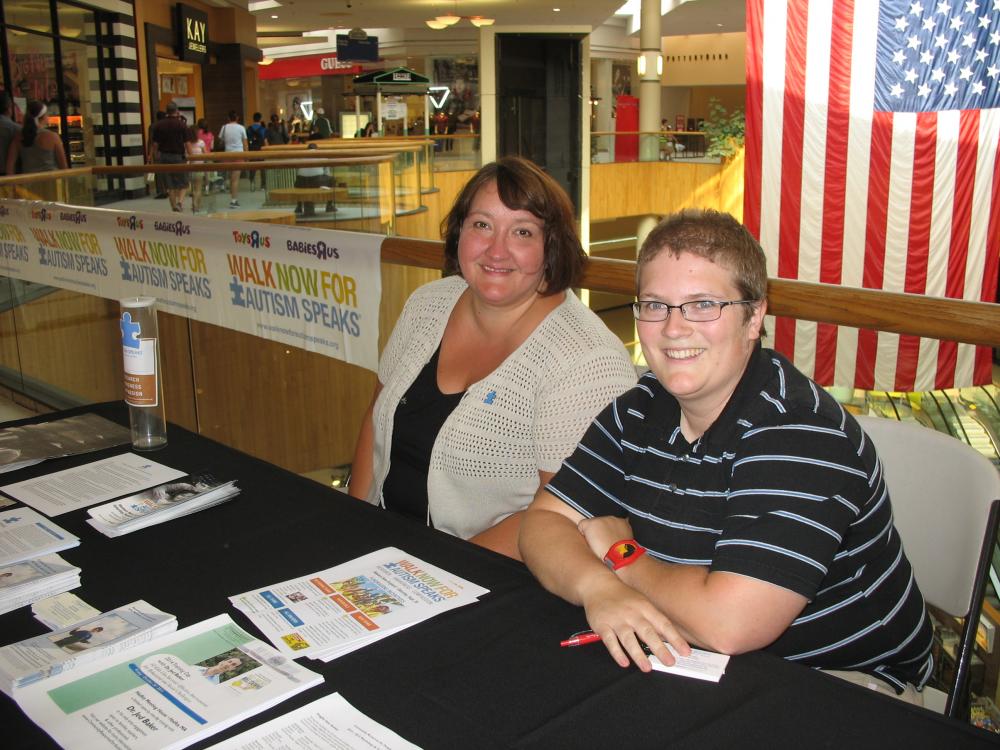One in 68 children are thought to have autism spectrum disorder, according to the Centers for Disease Control. The disorder varies widely in severity, but one common trait is the tendency to get overstimulated by noise, lights, and other trappings of modern life. A recent effort tried to bring down the sensory stimulation — just in time for back-to-school shopping.
The Holyoke Mall is one of the most obvious places to do back-to-school shopping, but one of the last places you’d take a child who has problems with sensory overload. That describes both of Mary Ellen Demaris’s sons.
“Things that are simple for other kids — like going shopping — are really hard for kids with autism,” she says.
Demaris is shopping with her oldest boy, a high-functioning 8-year-old who was able to keep it together for the duration of their mall errands.
It’s her 7-year-old, who’s more severely autistic, she really worries about.
“He actually uses a wheelchair because just even walking in the mall is hard for him, so he’s better if he’s safe in the seat,” Demaris says. “He’s very loud, he gets very stimulated here…he flicks his hands, he makes a lot of vocal sounds. It’s really hard for him to come out and do things like this.”
But on this late August evening, she’s on her way to pick him up from his therapist and bring him back here. That’s because mall management agreed to designate five hours as sensory-friendly back-to-school night. They turned off the Muzak that usually pipes through the common space, lowered the lights and asked individual stores to turn down any music or strobe lights.
“And then we have near the pottery barn, is a quiet area — at least, as quiet as the mall can be without being an inside soundproof space,” says Hope Tremblay.
Tremblay is the mother of a six-year-old autistic son, and a member of the group Autism Speaks. She came up with this idea after working on two other sensory-friendly events at the mall — a Santa Claus meet-and-greet that took place before the shops opened, and a low-key Easter Bunny gathering.
“I appreciate the mall is trying to…give folks an opportunity to at least try….just that hope that they can make it through a shopping trip…and mom and dad aren’t pulling their hair out at the end,” she says.
Sensory-friendly events have become more common nationwide as autism rates climb. Theaters now offer sensory-friendly movies; cafes host quiet hours. Sarah Hunter is with Community Resources for People with Autism. She says this trend does more than just accommodate the harried parents of autistic children.
“Just in saying this is a sensory-safe time or autism friendly time, that says to parents, ‘We know about autism. We understand your kids. If your kid comes and has a meltdown, you don’t have to worry as much about being judged by other people,'” Hunter says. “That’s a huge thing that keeps people at home and not in the community, is feeling that people are judging them.”
Hunter joined Hope Tremblay at an information booth outside Target, where parents like Amy Tosi stop by. Tosi saw the event advertised on Facebook, so she brought her 11-year-old son Mac, who’s on the autism spectrum. She asks him what he thinks of the changes.
“Well, it seems a little different.,” Mac says. “It’s just like nicer, and much more gentler.”
But even though the sights and sounds were more muted than usual, it’s still a triple-decker shopping mall, and if you didn’t know it was sensory friendly night, you might not be able to tell. Many retail workers didn’t know about the event or chose to keep on their shop’s music regardless.
At the Apple store, an employee had apparently forgotten about the quiet hours. While he was happy to shut off the music, the in-store chatter was so loud, it was hard to tell the difference.
A Holyoke Mall spokesperson says next time they host a sensory-friendly shopping night, they may be stricter about stores turning off their music.
The organizers don’t know if any of the autism families used the designated quiet area, but there were some regular mall shoppers who chose to sit there.
And that underscores another reason, Hunter says, that sensory-friendly mall nights could really catch on: It’s not just autistic children who prefer a toned down shopping experience.
“Oh, yeah. I hate noise,” Hunter says. “I never go to the mall! I feel like that’s something I get about these kids. I get sensory-overwhelmed, as well.”
But while many of us can relate, she adds, it’s important to distinguish between a preference for peace and quiet, and a brain that really needs it.
